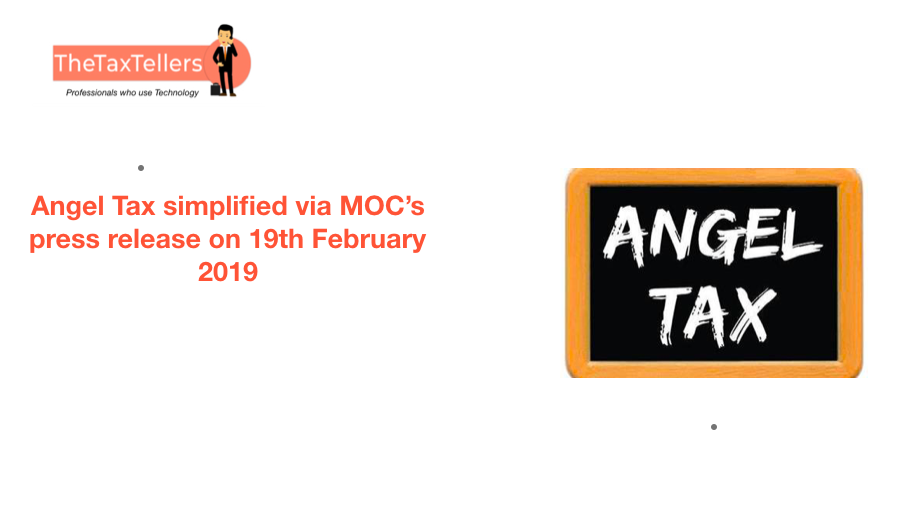Benefit granted to Startups - Angel Tax made lenient!
<Please refer to previous Blog for grasping about angel Tax issue>
A long demanded and sought change has been brought into DIPP regulations and Income Tax resolving issue of Angel Tax.
Briefly, let’s talk about the changes that have been introduced to address the issue of angel tax which has raised eyebrows of tax authorities at every new funding introduced in Startup. Not only this, the concern has addressed the issue of numerous startups who were considering to eternalise their structures.
Highlights of changes introduced by DPIIT latest notification for Angel tax on 19th February 2019:
Definition of Start-ups will be expanded: An entity will be considered as a Start-ups upto a period of 10 years from the date of incorporation and registration in place of the earlier duration of 7 years (refer our earlier blog on Angel Tax).
Condition of turnover relaxed: An entity will continue to be recognised as a Start-up if its turnover for any of the financial years since incorporation and registration has not exceeded Rs. 100 crore in place of Rs. 25 crore earlier.
Relaxation from Angel Tax: A start-up will be eligible for exemption under Section 56(2)(viib) of Income Tax if it is a Private Limited Company (Pvt. Ltd.) recognised by DPIIT and is not investing in any of the following assets:
(i) building or land appurtenant thereto, being a residential house, other than that used by the Start-ups for the purposes of renting or held by it as stock-in-trade, in the ordinary course of business;
TheTaxTellers Comment: This appears to be a fair condition to save the money infused by Investors from being used in personal assets.
(ii) land or building, or both, not being a residential house, other than that occupied by the Start-ups for its business or used by it for purposes of renting or held by it as stock-in trade, in the ordinary course of business;
TheTaxTellers Comment: This appears to be a step ahead restricting the funded startups from investing in real estate for investment purposes..
(iii) loans and advances, other than loans or advances extended in the ordinary course of business by the Start-ups where the lending of money is substantial part of its business;
TheTaxTellers Comment: In order to save the money infused in a startup from being used in a business other than main object of the startup, this is a reasonable restriction.
(iv) capital contribution made to any other entity;
TheTaxTellers Comment: Same as above
(v) shares and securities;
TheTaxTellers Comment: Same as above
(vi) a motor vehicle, aircraft, yacht or any other mode of transport, the actual cost of which exceeds Rs. 10 lakhs, other than that held by the Start-ups for the purpose of plying, hiring, leasing or as stock-in-trade, in the ordinary course of business;
TheTaxTellers Comment: This appears to be a stringent condition. There may be CXOs in startups and as a part of remuneration startups may consider to offer cars above Rs. 10 lakhs to grow business and capitalisation.
(vii) jewellery other than that held by the Start-ups as stock-in-trade in the ordinary course of business;
TheTaxTellers Comment: Same as v.
(viii) any other asset, whether in the nature of capital asset or otherwise, of the nature specified in sub-clauses (iv) to (ix) of clause (d) of Explanation to clause (vii) of sub-section (2) of section 56 of the Act.
Exemption has been granted to startups for consideration received by eligible Start-ups for shares issued or proposed to be issued up to an aggregate limit of Rs. 25 crore. Further, exemption has been granted for consideration received by eligible Start-ups for shares issued or proposed to be issued to a listed company having a net worth of Rs.100 crore or turnover of at least Rs. 250 crore.
The aggregate limit of Rs. 25 crore will exclude consideration received by eligible Start-ups for the following classes of persons:
- Non-Residents
- Alternative Investment Funds- Category-I registered with SEBI
- Listed company having a net worth of Rs.100 Crores or turnover of at least Rs. 250 crore provided that its shares are frequently traded as per SEBI (Substantial Acquisition of Shares and Takeovers) Regulations, 2011
Manner of claiming exemption:
Also, in order to claim exemption under section 56(2)(viib), no separate application has to be submitted with Income tax, only a declaration has to be filed with DPIIT which will then be forwarded to CBDT.
We hope you found the above note useful. We would be delighted to have your comments at info@taxtellers.com.
Regards,
TheTaxTellers Team

